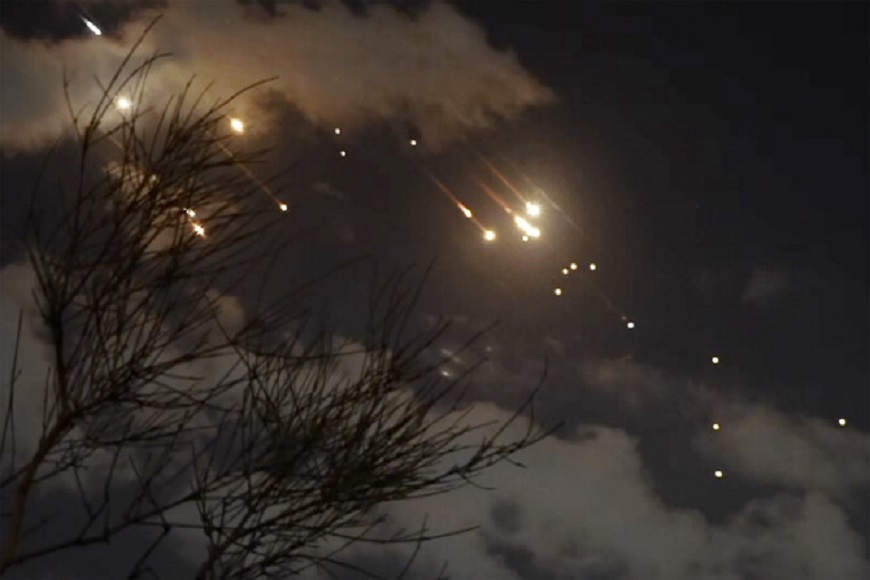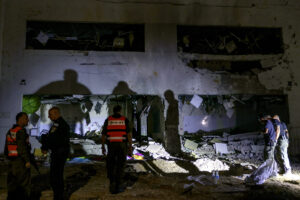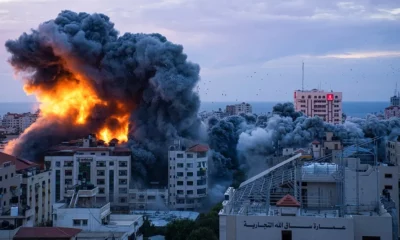US News
Iran launches missile attack on Israel
Published
2 months agoon
By
Admin
On October 1, 2024, Iran launched a significant missile attack on Israel, escalating tensions in the Middle East to alarming levels. The Iranian Revolutionary Guard Corps (IRGC) fired approximately 180 to 200 ballistic missiles toward Israel, targeting multiple locations, including Tel Aviv and Jerusalem. Iran’s actions were described as retaliation for Israel’s ground incursion into southern Lebanon the previous day, which was aimed at Hezbollah, an Iranian-backed militant group operating in the region. This missile barrage was seen as one of the largest coordinated attacks between the two nations in recent years
The missiles were primarily intercepted by Israel’s Iron Dome defense system, although several explosions were still reported. Millions of Israelis took shelter as sirens blared across the country, with air defenses lighting up the night skies. Israeli Prime Minister Benjamin Netanyahu condemned the attack, warning that Iran had made a “big mistake” and that it would face consequences. He also affirmed Israel’s right to defend itself, signaling that a counter-response was imminent
Iran claimed that its missile strikes were part of a broader strategy of self-defense, framing the assault as a response to Israel’s continued aggression in Lebanon and the wider region. Tehran also issued a stark warning: any further Israeli retaliation would be met with “more crushing and ruinous” responses, potentially pushing the entire Middle East toward a broader conflict. Iran’s foreign minister suggested that unless Israel escalated the situation, the missile attacks had concluded for the time being

International reactions were swift and condemning. The United States reaffirmed its strong support for Israel, with U.S. Defense Secretary Lloyd Austin emphasizing that American forces in the region were ready to provide additional defensive support if needed. The U.S. also warned Iran that any attacks on American interests would be met with firm responses. Jordan’s air defenses were also activated during the assault, intercepting several missiles and drones that crossed into its airspace
The missile attack occurred against a backdrop of heightened tensions in the region. Israel had recently expanded its military operations in Lebanon, targeting Hezbollah positions. The missile strikes from Iran were viewed by many as a direct challenge not just to Israel, but to Western influence in the Middle East, particularly U.S. involvement. The possibility of further escalation looms large, with regional powers such as Jordan, Iraq, and Lebanon monitoring the situation closely
As of now, both nations appear to be at a crossroads. While Israel is expected to retaliate, likely with more airstrikes in Lebanon or Syria, Iran’s warning of a devastating counterstrike remains a significant deterrent. The international community, particularly Western allies, has called for restraint and dialogue, though prospects for de-escalation remain uncertain.
The current conflict has reignited fears of a broader regional war, drawing attention to long-standing hostilities between Israel and Iran, both of which have entrenched military alliances with neighboring countries and militant groups. The situation continues to evolve, with international observers calling for caution as military engagements escalate across multiple fronts in the region.
ARK: Survival Evolved Game Icons and Banners

cute:i1cdycptg50= drawings

Understanding New York Sports Club Membership: What It Offers and What Affects the Cost

Safety Tips for Compressed Air Dryers

drawing:23vyczbybxu= billie eilish

drawing:056aoyw74ce= rick and morty

drawing:4oyh4y0aqsa= santa claus

24 Hour Fitness Cost: How Much Is 24 Hour Fitness Membership?

drawing:7barsug8u0w= spider man

drawing:_ckgvun2dpk= flower

How can online food delivery sales increase and attract the maximum number of customers in 2023?

MEP BIM: Revolutionizing Building Infrastructure Design

Revolutionizing Industries with ChatGPT

Resolving the Israeli-Palestinian Conflict: A Comprehensive Analysis

Skillful Passion: Wisconsin’s Dominant Volleyball Team

Virtual Reality Rental: A Futuristic Experience

Negin Behazin vs Dignity Health: Comprehensive Comparison

Unlocking the Potential of cryptonewzhub.com Internet

iPhone 14 Pro Max: Unveiling the Next Level Innovation

Unraveling the Mystery: Robert Card’s Tragic Passing
ARK: Survival Evolved Game Icons and Banners

cute:i1cdycptg50= drawings

Understanding New York Sports Club Membership: What It Offers and What Affects the Cost

Safety Tips for Compressed Air Dryers

drawing:23vyczbybxu= billie eilish

drawing:056aoyw74ce= rick and morty

drawing:4oyh4y0aqsa= santa claus

24 Hour Fitness Cost: How Much Is 24 Hour Fitness Membership?

drawing:7barsug8u0w= spider man





